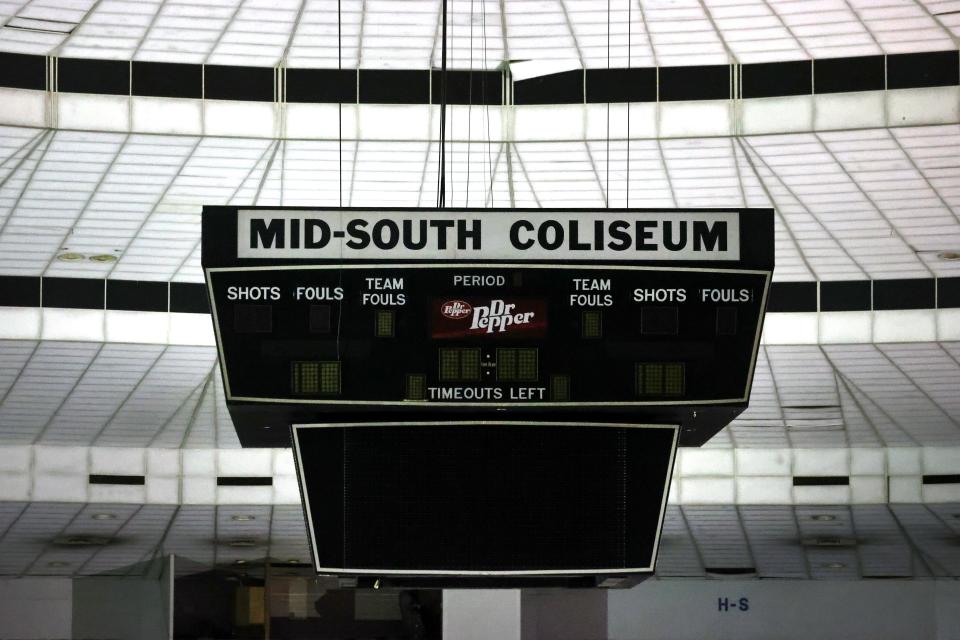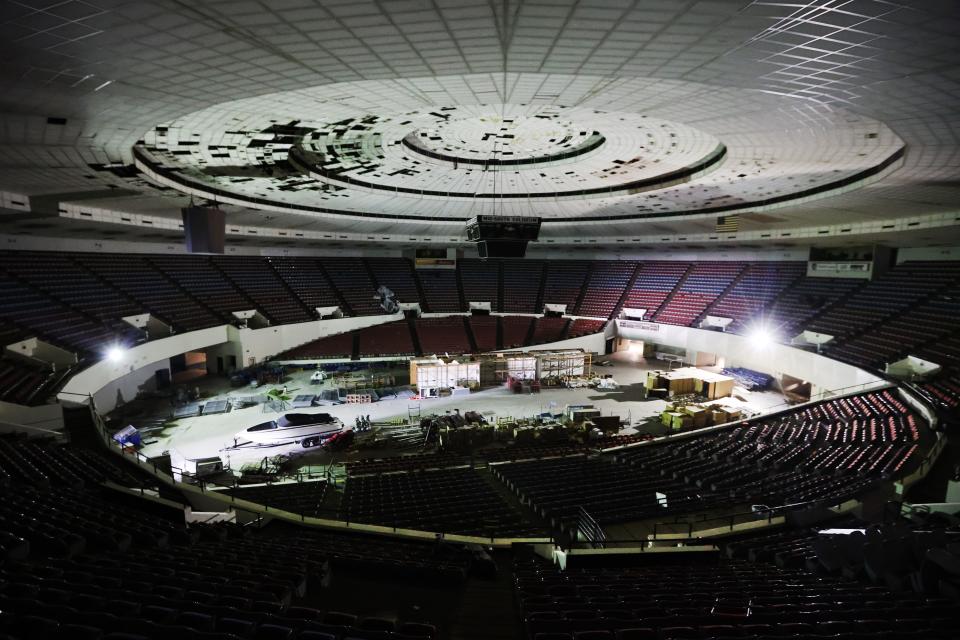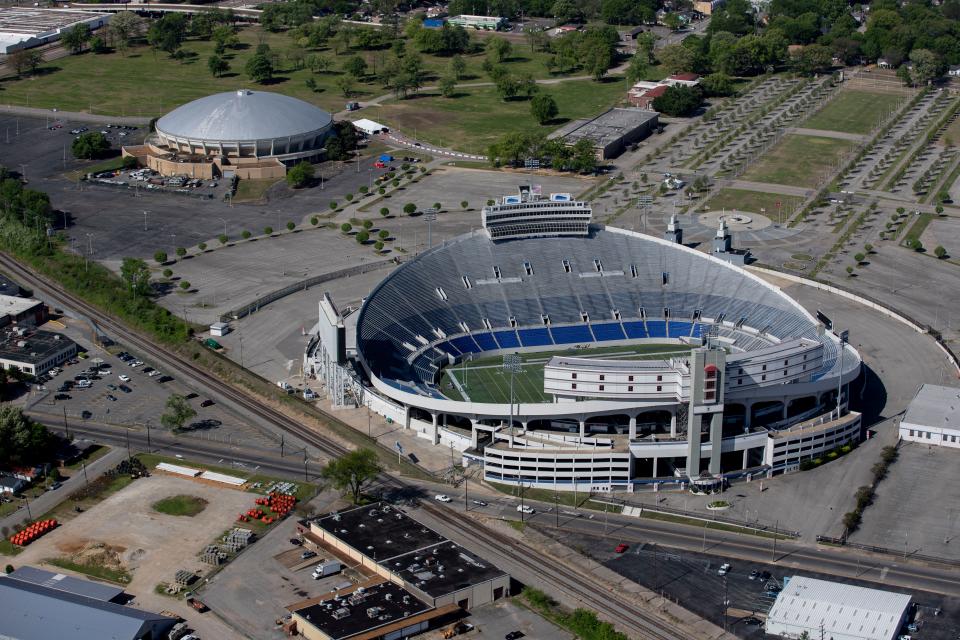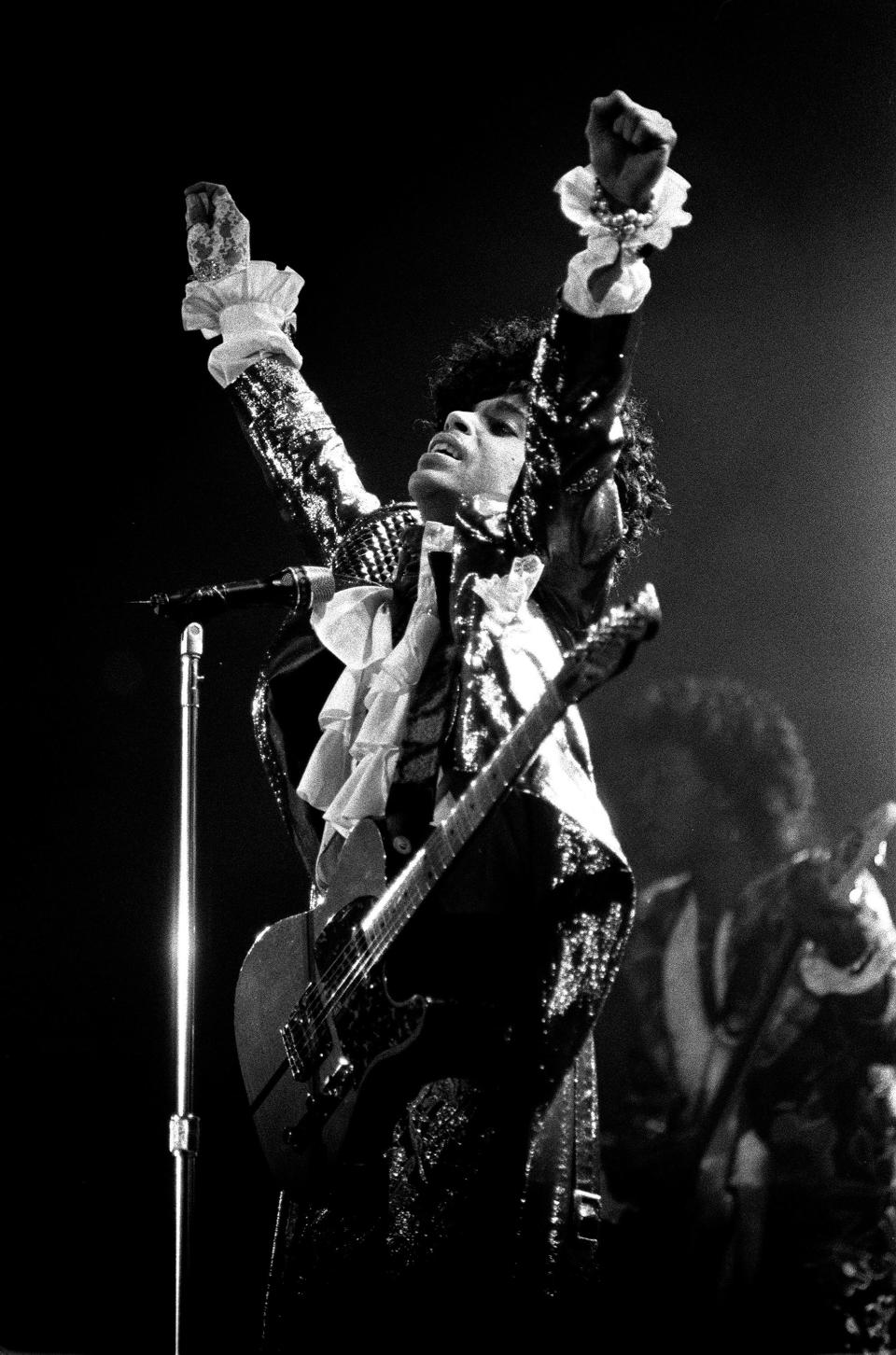Can Mid-South Coliseum dodge the wrecking ball for good? New group is fighting to save it
For Memphians of a certain age (old) and a certain mindset (hip?), the Mid-South Coliseum remains the city's iconic arena.
FedExForum is wonderful, but its relationship with Memphis is somewhat fraught. The building belongs to a modern era in which millionaire team owners demand public funding for their playhouses, all the while hinting they may one day leave for greener (as in $greener$) pastures.
The Liberty Bowl is pretty much used only during football season, and, anyway, it's not even the "Liberty Bowl" any more. (Officially, it's the Simmons Bank Liberty Stadium.)
And nobody really misses The Pyramid, a place notable for cramped seating, a conical shape that swallowed sound, and a relatively short lifespan (after less than 25 years, it was reconfigured into a fishing rod-and-duck decoy store).

But the Coliseum, built in 1964 to be "The Entertainment Capital of Mid-South," is undeniably cool, from its flying saucer shape to its good-times history.
It was the home of Gene Bartow's Memphis Tigers (remember when Tiger basketball made you happy?); the place where the Beatles and "Purple Rain"-era Prince performed; and the spot where Jerry Lawler gave Andy Kaufman a piledriver (rarely has an alleged impacted vertebra been so newsworthy).
In addition, the city-owned venue is significant for more than the action of its basketball courts, concert stages and wrestling rings. The Coliseum from day one was a racially desegregated arena — the first such public facility built in Memphis.
So, the Coliseum, which closed in 2006, continues to stir emotions and inspire activism among preservationists and pop-culture mavens alike.
"Growing up, I spent a lot of time in the Coliseum," said Corey Strong, co-founder of the Mid-South Coliseum Conservancy, a new organization that represents an expanded approach to saving the arena from the wrecking ball. "I want to see this place that I always loved thrive and grow in a way that is true to the city itself."
Conservancy joins Coalition
For almost a decade, the save-the-Coliseum charge has been led by the Coliseum Coalition, a grassroots organization that hosts Coliseum tours; organizes "Roundhouse Revival" events to promote the preservation effort; and meets with public officials, business innovators and media representatives to spur interest in renovating and reopening the building.
On March 11, the Mid-South Coliseum Conservancy registered as a nonprofit with the state. “We welcome this new group,” said Marvin Stockwell, co-founder of the Coliseum Coalition. “They have strengths that we don’t have. They are going to help us reopen the Mid-South Coliseum.”
Said Strong: "We see our roles as complementary."
Founded by Strong, former chair of the Shelby County Democratic Party, and Ken May, a former executive with Krispy Kreme, Topgolf and FedEx Office, the Conservancy plans to stress the potential for "economic development" that could accompany a reopened Coliseum, Strong said. The group wants to act as a sort of liaison or matchmaker between potential developers and the city.

Strong cites Crosstown Concourse as a model for what could occur at the Coliseum.
Developed from a long-empty Sears store and catalog warehouse, the Concourse features apartments, restaurants, bars, galleries, music and art studios, a radio station, the Church Health Center, a YMCA, a theater, a school and more — in other words, a mix of commercial businesses and nonprofit agencies.
"The community is using the building all the time," said Strong, 43. "For-profit businesses are able to do well because there is a community focus."
Strong named the Tennessee Brewery (with its loft apartments), the Old Dominick Distillery and the University of Memphis Cecil C. Humphreys School of Law (located in a former Postal Service building) as other examples of historic buildings that were in limbo until a visionary developer or development team was inspired to reinvent them.

Ashley Cash, director of the city Division of Housing and Community Development, said that while such advisory or activist groups as the Coalition and the Conservancy have no official capacity, "We encourage and welcome outside partners that want to help us redevelop the area." (The Community Development division is "the responsible party" for the Coliseum, Cash said, as well as the rest of the old Fairgrounds and its adjacent properties, much of which was refashioned into "Tiger Lane" in 2010.)
CONCERTS AT THE MID-SOUTH COLISEUM: The Beatles, Elvis, Jay-Z and more: 15 Mid-South Coliseum concerts to remember
Mid-South Coliseum dream, schemes
So far, Coliseum schemes by realists as well as by romantics have come to naught.
Local artist Christopher Reyes has proposed transforming the Coliseum into "the greatest exploratory adventure playground in the world" by installing within its amplitude an "immersive" interactive experience he calls "Baron Von Opperbean's Exploraseum of Magic, Science, and the Multiverse," but this bold idea — which was realized, on a smaller scale, with a successful 2020 run in a Vance Avenue warehouse — has yet to catch fire with investors.
At one point, it seemed the Coliseum might be remade into a brewery, but that plan, too, failed to ferment.
Recently, the Coliseum seemed due for demolition. In late 2022, the city announced plans to knock down the building and then construct a soccer stadium for Memphis' professional team, 901 FC. But money for the soccer stadium was not included in a 2023 state allocation of $350 million for Memphis sports arenas; for the Coliseum, the omission represented a stay of execution.
Cash said the fate of the Coliseum at this point is entirely unknown. "Is redevelopment the best answer, or is there another use for that space?" she asked.
She said the cost to redevelop the Coliseum would be in "the 30s of millions," with "abatement issues" alone being extraordinarily expensive, whether the building is remade or demolished.
Whatever its future, the Coliseum needs a champion developer or "creative," and Strong said the believes the Conservancy can help find such a person or team, thanks to the skills of its board.
In addition to Strong and May (now CEO of JumpShot, a basketball-themed entertainment company), board members include Dawn Campbell, general counsel with LifeLinc, a healthcare company; activist Paula Casey, instrumental in developing the monuments and memorials erected across the state in recent years to mark the Tennessee Woman Suffrage Heritage Trail; J.W. Gibson, founder of The Gibson Companies, which includes medical and laboratory supply services; architect Marika Snider, director of Interior Architecture at the University of Memphis; and veteran radio personality Ron Olson.

"This is a group of people with roots in this community and professional bona fides," said Strong, who boasts an impressive résumé of his own.
A lifelong Memphian, Strong is a graduate of the U.S. Naval Academy at Annapolis and the U of M law school. A "surface warfare officer" who has served around the globe, he became active in Democratic politics after returning to Memphis and also worked in Shelby County Schools. He is former Director of Strategic Partnerships with First 8 Memphis, a nonprofit established to help local children achieve in school, and he remains active in politics: Currently, he is challenging incumbent Steve Cohen to be the Democratic nominee in the race for Tennessee's 9th Congressional District. (Strong previously challenged Cohen in 2020, but lost.)
Strong said the board believes the Coliseum could return as a smaller-sized arena, with some of the former backstage, loading and ancillary space refitted for community and commercial use. "We've got 18,000 seats at FedExForum and 2,500 at the Orpheum," he said. "We think there's a sweet spot in between" — a spot for the shows that now go to Mississippi's Landers Center and BankPlus Amphitheater. Bringing those shows to Memphis would give the Coliseum a role in boosting "economic development."
He said the Grizzlies' "no compete" clause, which gives the Grizzlies organization the right to veto shows of a certain size in competing venues, could be negotiated.
"People forget that for two years after FedExForum was open, the Coliseum was operating," he said. "That's how it's worked for two years. There's room for a conversation with FedExForum about that."
This article originally appeared on Memphis Commercial Appeal: Will Mid-South Coliseum be saved? New group works to make that happen

